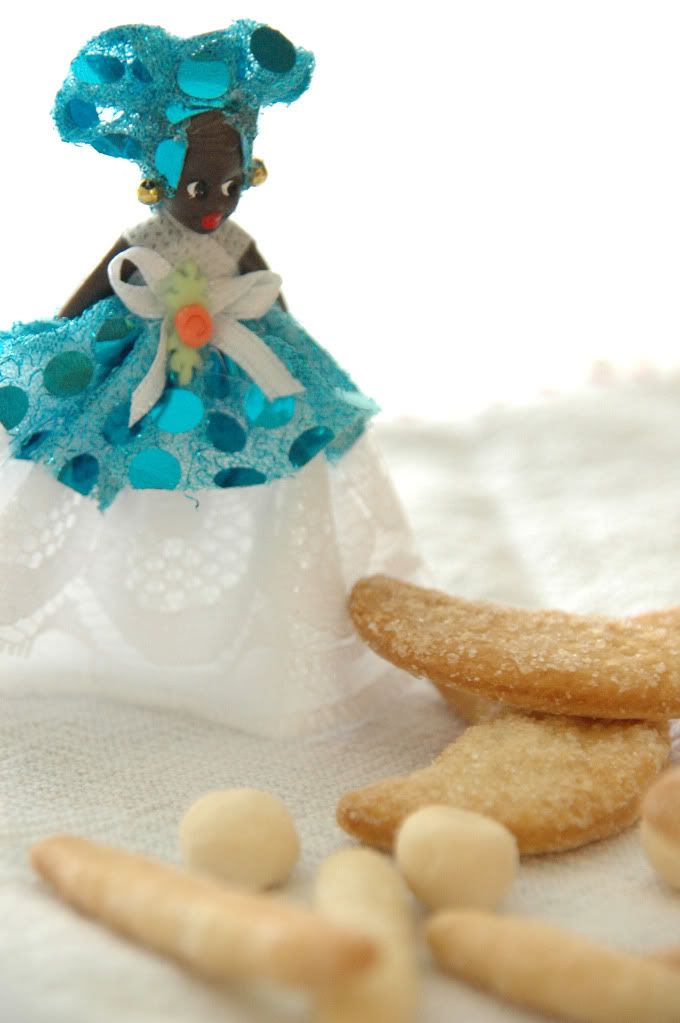 What a cheep shot eh? I didn't even go to Bahia and yet i get to stuff my face full of its bounty. successss. Well if there's anything that will get you somewhere, it's having sampled it. And i would say that the late night arrival of the Jet Setting sisters as they opened their suit cases full of edible goodies (you know you're with the right crowd when food takes up the place of clothes) and after a showering of hugs D turns to me with glee "all sem gluten! everything we found it all!" Now whether or not the notion was pulled particularly for me or not doesn't matter, there isn't a way in the world one could be left feeling less than a hundred dollars. As half the state of Bahia exploded onto the kitchen table in edible form, and midget camera cards were shoved at me to download quickly for prompt viewing, i was lost amidst the excited sped laughs of the travelers as they recapped the week away to see family that nearly three decades had separated them from. One doesn't need words to understand what's going on; happiness is a pitch, a taste, and a look. I knew exactly what they were saying, in hieroglyphic form. And this cod fish biscuit? Dear god somebody pinch me. on y va.
What a cheep shot eh? I didn't even go to Bahia and yet i get to stuff my face full of its bounty. successss. Well if there's anything that will get you somewhere, it's having sampled it. And i would say that the late night arrival of the Jet Setting sisters as they opened their suit cases full of edible goodies (you know you're with the right crowd when food takes up the place of clothes) and after a showering of hugs D turns to me with glee "all sem gluten! everything we found it all!" Now whether or not the notion was pulled particularly for me or not doesn't matter, there isn't a way in the world one could be left feeling less than a hundred dollars. As half the state of Bahia exploded onto the kitchen table in edible form, and midget camera cards were shoved at me to download quickly for prompt viewing, i was lost amidst the excited sped laughs of the travelers as they recapped the week away to see family that nearly three decades had separated them from. One doesn't need words to understand what's going on; happiness is a pitch, a taste, and a look. I knew exactly what they were saying, in hieroglyphic form. And this cod fish biscuit? Dear god somebody pinch me. on y va.
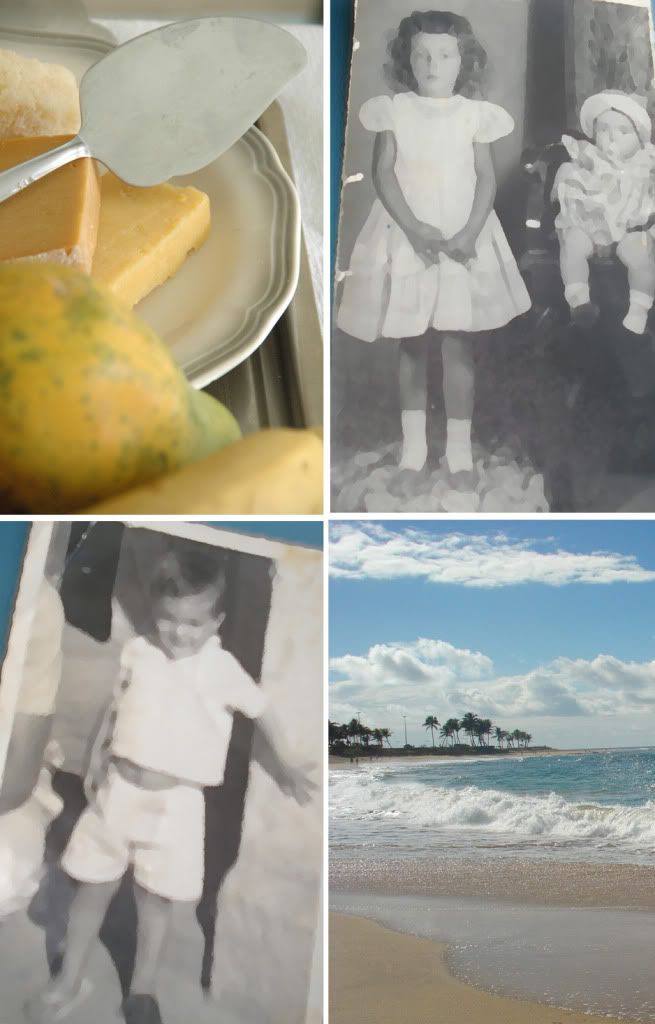
Where is Bahia? What is Bahia? It sounds like a beach. No, i didn't say the Bahamas. Located in the northeast corner of the country, Bahia is the fourth most populous state in Brasil, of which its capital city, Salvador, is undoubtedly what gives Brasil its most famous image abroad: Carnival dancers and beach bums sitting around drinking coconut water. success. But wait--isn't that Rio? Hmmm, i dunno. It's very difficult after all to give a nation that is larger than the US only one image of stereotype. A Paulista, Carioca (from Rio), a Bahian (?), and a Bahhh-ian (hehehe, people from Porto Alegre. I guess they are gauchos eh?) are as stereotypically different as a Texan, an Orgonian, and a New Yorker. so a priest and a Rabi walk into a bar...Bahia is the archaic Portuguese word for bay, as the state was named after All Saint's Bay, of which Salvador sits atop the cliff. Bahia pulls the second greatest volume of tourism in the country, behind what i can only presume must be Rio di Janiero. When images of Brasilian afro-influenced heritage arise, it is historically from Bahia and the rest of the northeast where they originate, as Bahia was a center of the sugar cane harvest that relied heavily on African slave labor.
A central historical region, Bahian architecture is left over from the colonial Portuguese who settled in the sixteenth century and created, in essence, mini Lisbons and Oportos. Bahia, like Minas Gerais, more so than the southern states of Brasil, maintains a much more historical connection to the colonial past as a direct result of occupation. Cabral arrived in 1500 at Porto Seguro on the southern Bahian coast; fifty years later, settlers founded Salvador, and either their saudade for the homeland or lack of creativity influenced not only the architecture, but the city planning and decor as well. Salvador--full name being São Salvador da Baía de Todos os Santos, "Holy Savior of All Saints' Bay," (you can see the need for abreves here) is the capital and largest city. D is from the city Vitória da Conquista, the third largest city in Bahia after Salvador and Feira de Santana, and as word has it has grown astronomically over the past couple decades due to commerce, industry, coffee production, and the status as a university town (Universidade Estadual do Sudoeste da Bahia.) The return after thirty years was to a city that was much different for her, though at the same time much the same.
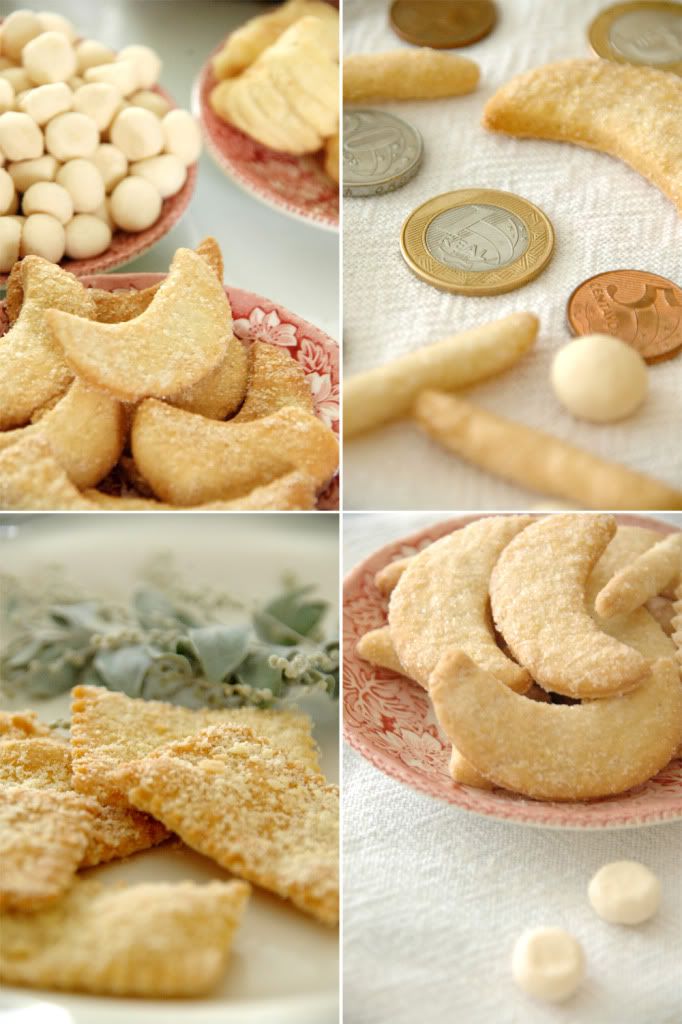 So what of this food then. The topic: biscuits and banana leaves. biscuits? yes. my eyes widened as bag upon bag of biscuits all pretty, pale, and sparkling emergered one after the other. and these are all gluten free? Alongside the biscuits were other Bahian traditional goodies; little coconut cakes, pressed sugarcane candy in a banana leaf--gold mine. Eager to try everything--at the same time--i was confused slightly by how a few of those present reached for nothing. You see, H explained to me in front of everyone under the guise of our secret language, they look down on Bahia, to them this would be like someone in the US bringing back a whole bunch of junk from Mexico. hmmm...really? well, all i can say is--sucks to be them.
So what of this food then. The topic: biscuits and banana leaves. biscuits? yes. my eyes widened as bag upon bag of biscuits all pretty, pale, and sparkling emergered one after the other. and these are all gluten free? Alongside the biscuits were other Bahian traditional goodies; little coconut cakes, pressed sugarcane candy in a banana leaf--gold mine. Eager to try everything--at the same time--i was confused slightly by how a few of those present reached for nothing. You see, H explained to me in front of everyone under the guise of our secret language, they look down on Bahia, to them this would be like someone in the US bringing back a whole bunch of junk from Mexico. hmmm...really? well, all i can say is--sucks to be them.
All of the biscuits, though they tasted like almond, were made from flour of mandioca root; aka tapioca. Mandioca, manioc, polvinho, goma, puma--it all come from the same root, a magical "everything begins here" tuber that i have come to adore. my next novel: I fell in Love with a Manioc, (July 2012.) Crescents, pills, sticks, twists, salty, sweet--you can make anything from mandioca. And what have we here...aqui, isso é do bacalhau. excuse me? bacalhau? Cod fish Cookies? are you for serious? Truth: they taste like a less-dried out version of nabisco chicken in a biscuit; aiater R you would be very pleased with these.
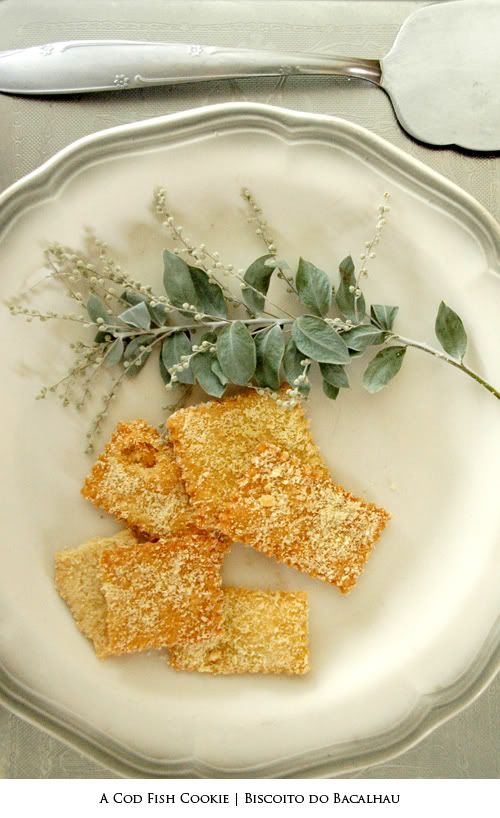 Aside from the never ending stream of pale-faced biscuits that appeared from Felix's bag; there appeared alongside a plethora of Bahian cheeses and some sweet candies, among them rapadura. Technically known as tijolo, the Portuguese word for brick, because it is usually made into a solid brick form that is fairly preserved and durable. Pretty much it is a hunk of pure sugarcane juice with spices such as cinnamon and a LOT of ginger, nuts, and even fruits. Hmmm, i thought as i racked my brain to try and communicate what i was tasting, para mim, euuuh, isso é um sabore de natal. gingimbre é muito natal. mmmm. You can find out more about rapadura here or at more my level here. Rapadura first appeared in the 18th century by slaves who worked on the sugarcane plantations; high in minerals and other things that seem to give one energy, it was a crucial part of the diet as it preserved well and could last for long periods of time. according to H, this is the food that has and always will keep people from starving. For its history, the candy is commonly considered comida de pobre, food for the poor (yes i translated that myself).
Aside from the never ending stream of pale-faced biscuits that appeared from Felix's bag; there appeared alongside a plethora of Bahian cheeses and some sweet candies, among them rapadura. Technically known as tijolo, the Portuguese word for brick, because it is usually made into a solid brick form that is fairly preserved and durable. Pretty much it is a hunk of pure sugarcane juice with spices such as cinnamon and a LOT of ginger, nuts, and even fruits. Hmmm, i thought as i racked my brain to try and communicate what i was tasting, para mim, euuuh, isso é um sabore de natal. gingimbre é muito natal. mmmm. You can find out more about rapadura here or at more my level here. Rapadura first appeared in the 18th century by slaves who worked on the sugarcane plantations; high in minerals and other things that seem to give one energy, it was a crucial part of the diet as it preserved well and could last for long periods of time. according to H, this is the food that has and always will keep people from starving. For its history, the candy is commonly considered comida de pobre, food for the poor (yes i translated that myself).
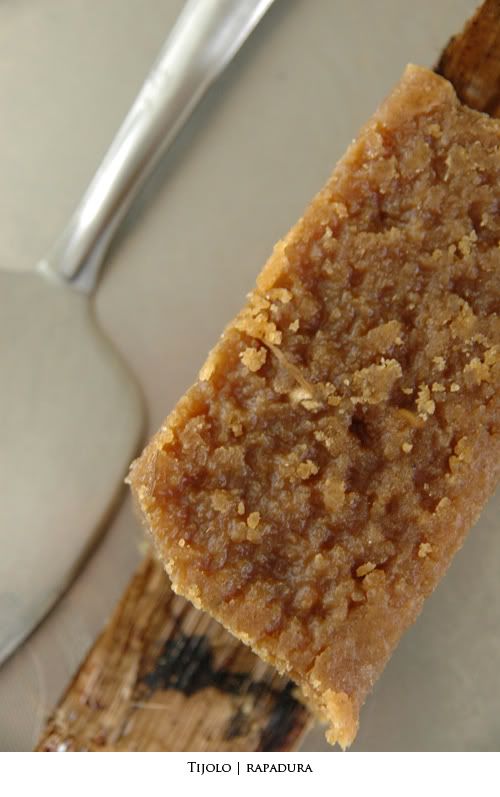 As i thought of what H had said about Bahia being considered lower class it all made sense; there is much prejudice to be found anywhere, i began to think; perhaps that is how i would act if someone unloaded on my dining room table a bag of grits and collards brought back fresh from Mississippi, blech, i would think, southern food. I am not sure where this prejudice came from, i have no aversion to the culture of the southern states of the US, on the contrary i have never even experienced them, but somehow, somewhere along the way, the image and notion was planted, there is a sense in the back of my mind that connects such types of food as poor food, as country food, as lower class food. Food is as much a marker of social status and class boundary as anything; we have to be careful to not allow that to get in the way of our taste buds, else you may find yourself in regret for having missed out on something intrinsically delightful. It is impossible to control ingrained thoughts, but it is what you do with them that matters.
As i thought of what H had said about Bahia being considered lower class it all made sense; there is much prejudice to be found anywhere, i began to think; perhaps that is how i would act if someone unloaded on my dining room table a bag of grits and collards brought back fresh from Mississippi, blech, i would think, southern food. I am not sure where this prejudice came from, i have no aversion to the culture of the southern states of the US, on the contrary i have never even experienced them, but somehow, somewhere along the way, the image and notion was planted, there is a sense in the back of my mind that connects such types of food as poor food, as country food, as lower class food. Food is as much a marker of social status and class boundary as anything; we have to be careful to not allow that to get in the way of our taste buds, else you may find yourself in regret for having missed out on something intrinsically delightful. It is impossible to control ingrained thoughts, but it is what you do with them that matters.
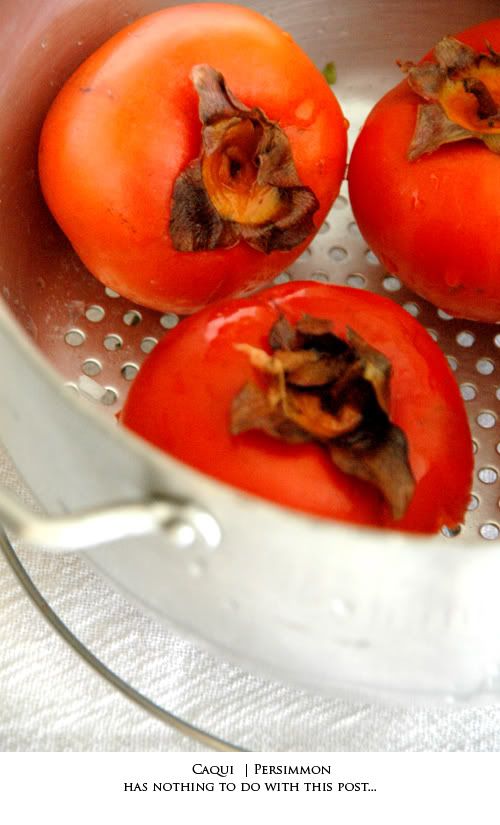 When I sat down to "talk out" what all these edibles were with D, she mentioned how the day happened to be Bahian independence day. what? it's its own country now? When Brasil broke from Portugal, Bahia was the last state to join the independent confederation. It is not the Brasilian independence, she continued, that is---September 7th, i cut in, i know that day. It happens to be one of my favorite days. Back to the subject--Brasilian Independence was declared on September 7th 1822, though a pocket of elite loyalists in Bahia remained true to the Portuguese crown--hmm sounds familiar, we call them Tories, but eventually they shoved off for Canada--the loyalists somehow stood their ground in battle until finally falling to the union on 2 July 1823. Hence 2 July is Bahian independence. Huh, i responded, July seems to be a very hot-headed month for revolutions; the Americans on the 4th, les Francaises on the 14th, and the Bahians on the 2nd. AND the most important of all--the Canadians on the 1st. Well. A
When I sat down to "talk out" what all these edibles were with D, she mentioned how the day happened to be Bahian independence day. what? it's its own country now? When Brasil broke from Portugal, Bahia was the last state to join the independent confederation. It is not the Brasilian independence, she continued, that is---September 7th, i cut in, i know that day. It happens to be one of my favorite days. Back to the subject--Brasilian Independence was declared on September 7th 1822, though a pocket of elite loyalists in Bahia remained true to the Portuguese crown--hmm sounds familiar, we call them Tories, but eventually they shoved off for Canada--the loyalists somehow stood their ground in battle until finally falling to the union on 2 July 1823. Hence 2 July is Bahian independence. Huh, i responded, July seems to be a very hot-headed month for revolutions; the Americans on the 4th, les Francaises on the 14th, and the Bahians on the 2nd. AND the most important of all--the Canadians on the 1st. Well. A Biscuits, Bahia, Independence, family--life doesn't suck. And with a biscuit made out of cod, a weekend visiting friends and family on the back of a red motorcycle, getting lost in the neighboring city of Sorocaba on the way to another festa julhina, a backyard barbecue for little brothers entire English class, and night time riding with old jazz music--life definitely does not suck. oh did i mention the cod cookie?
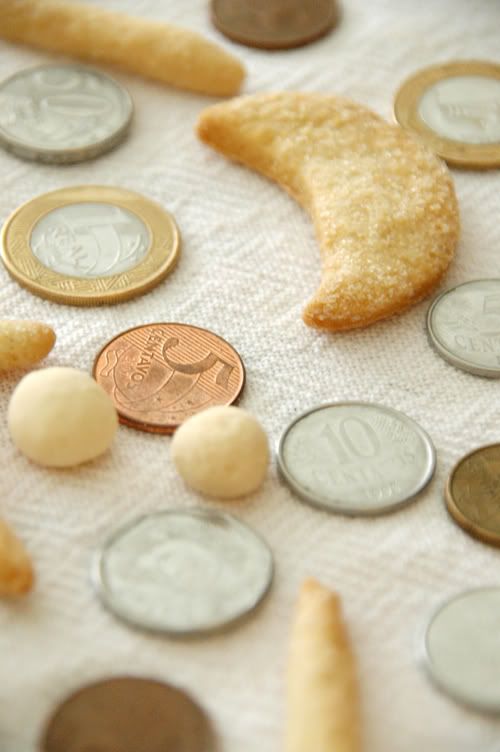 a bientot
a bientot



8 comments:
I've traveled all over Brasil and I love Bahia. This post reminded me of the beautiful people and the amazing food! Lucky you to get to sample it all :)
OMG! You are Canadian and you didn't mention Canada Day - July 1st - a commemoration of Canada becoming a single country! July is indeed a hot month for nationals. Can't wait to try 'Chicken in a Biscuit' cookie :-)
Hey Mallory!
I'm so glad you're getting to see a lot of this diverse country and, most of all, that you're appreciating the regional cultural differences and enjoying them in their own authentic glory! It is true, it's almost impossible to pin down "one" image that "represents" a country this diverse and rich in cultural heritages... not that there's anything wrong with beach bums sipping coconut milk!
I don't know why so many countries have their independance days in July... maybe it's just the hot weather makes people subversive, but seriously, I can count like 10 countries off the top of my head! Weird, eh?
Oh, by the way, I just noticed you're from Spokane and I realized that most of the TV stations we get here are from Spokane, so it makes me think of you when the used car commercials come on :)
On June 20, 1868, a proclamation signed by the Governor General, Lord Monck, called upon all Her Majesty's loving subjects throughout Canada to join in the celebration of the anniversary of the formation of the union of the British North America provinces in a federation under the name of Canada on July 1st.
Not exactly a revolution... but certainly revolutionary...
Le 400e anniversaire de la fondation de la ville de Québec, que nous célébrerons en 2008, rappelle que la langue française fut la langue fondatrice du Canada.
vive la Tourtiere.
OK OK CA VA CA VA! an addendum HAS BEEN MADE to include the true north strong and free...i don't know how i could have left it out, i apologize to my (hehe) fellow countrymen truly from the bottom of my heart. c'est juste que un slip of the tongue.
sincerely,
The Salty Cod &co.
Ooh, cod cookies? Probably not my cup of tea but what a treat for you! I do love things made with tapioca in nearly any form, though.
oh those biscuits look so delicate!
Oh man, that looks good. When we came back from a vacation visiting family in Brasil, half of one suitcase was filled with chocolate. American chocolate just doesn't taste the same!
Even though (I don't think) anybody in our family is from Bahia, my mom makes rapadura because she's from the north. :) And my favorite thing made made from mandioca flour is fried farofa with with bacon and onions in it! It's so tough finding manioc flour sometimes though...
Post a Comment